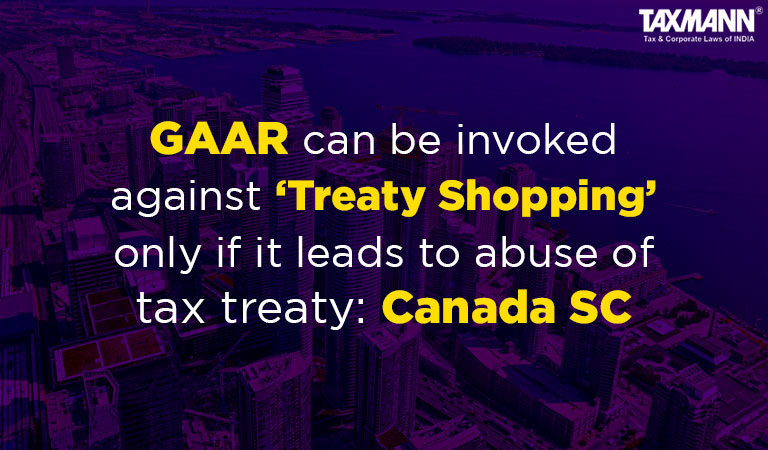GAAR can be invoked against ‘Treaty Shopping’ only if it leads to abuse of tax treaty: Canada SC
- Blog|News|International Tax|
- 2 Min Read
- By Taxmann
- |
- Last Updated on 3 November, 2022

Case Details: Her Majesty The Queen v. Alta Energy Luxembourg S.A.R.L - [2022] 144 taxmann.com 23 (SCC)
Judiciary and Counsel Details
-
- Abella, Moldaver, Karakatsanis, Cote, Brown, Rowe, Martin & Kasirer, JJ.
Facts of the Case
In the given case, a large capital gain was realized by corporate resident of Luxembourg on the sale of shares whose value was derived principally from immovable property situated in Canada. An exemption was claimed under the carve-out provision of Article 13(4) of the Canada-Luxembourg Treaty.
Revenue denied the exemption by invoking GAAR and hold that Luxembourg-company had no “sufficient substantive economic connections” to Luxembourg. Thus, the treaty benefits under Article 13(4) cannot be claimed.
Supreme Court Held
The Supreme Court of Canada has ruled that Treaty Shopping per se is not abusive tax avoidance to attract General Anti-avoidance Rule (GAAR). Treaty Shopping is abusive tax avoidance and attracts GAAR, only when treaty shopping spoils the treaty bargain between two contracting states.
Luxembourg is a country well known for its broad tax treaty network and international tax haven regime, making it an attractive jurisdiction to set up a conduit corporation and take advantage of treaty benefits.
One can presume that Canada knew these features of Luxembourg’s tax system when it entered into the Treaty. Canada nevertheless entered into a bilateral tax treaty with Luxembourg with only minimal safeguards and thereby ignored many of the OECD’s suggestions.
Canada understood that it was dealing with a low-tax jurisdiction and it agreed to specific terms in the Treaty, such as the business property exemption. In this way, Canada effectively agreed to give up its right to tax certain entities incorporated in Luxembourg in exchange for the jobs and economic opportunities that the business property exemption would promote.
Disclaimer: The content/information published on the website is only for general information of the user and shall not be construed as legal advice. While the Taxmann has exercised reasonable efforts to ensure the veracity of information/content published, Taxmann shall be under no liability in any manner whatsoever for incorrect information, if any.

Taxmann Publications has a dedicated in-house Research & Editorial Team. This team consists of a team of Chartered Accountants, Company Secretaries, and Lawyers. This team works under the guidance and supervision of editor-in-chief Mr Rakesh Bhargava.
The Research and Editorial Team is responsible for developing reliable and accurate content for the readers. The team follows the six-sigma approach to achieve the benchmark of zero error in its publications and research platforms. The team ensures that the following publication guidelines are thoroughly followed while developing the content:
- The statutory material is obtained only from the authorized and reliable sources
- All the latest developments in the judicial and legislative fields are covered
- Prepare the analytical write-ups on current, controversial, and important issues to help the readers to understand the concept and its implications
- Every content published by Taxmann is complete, accurate and lucid
- All evidence-based statements are supported with proper reference to Section, Circular No., Notification No. or citations
- The golden rules of grammar, style and consistency are thoroughly followed
- Font and size that’s easy to read and remain consistent across all imprint and digital publications are applied



 CA | CS | CMA
CA | CS | CMA
